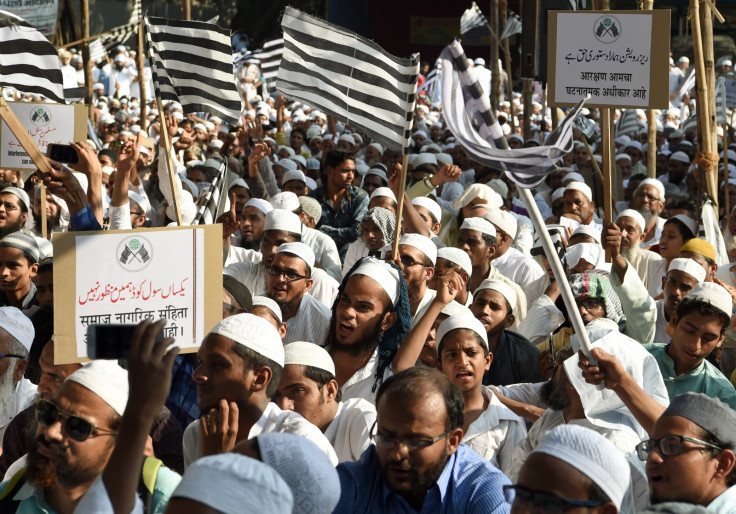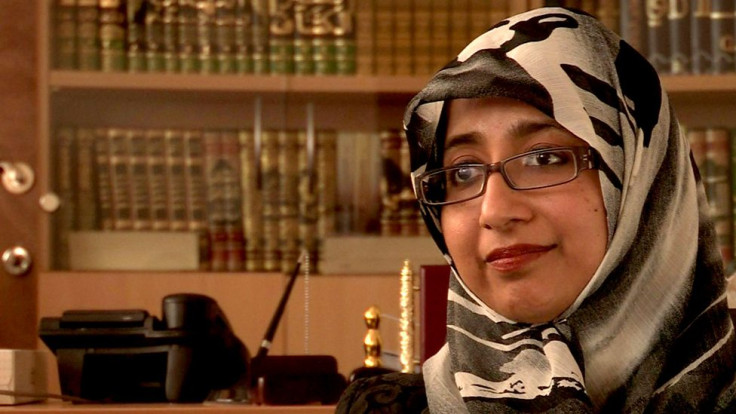What is triple talaq? The controversial Muslim law allowing instant divorce
Women's rights activists are calling for the "cruel" and "unjust" practice to be banned.

India's Supreme Court formally opened hearings on 11 May into several petitions challenging the Muslim practice of ''triple talaq'' which allows a man to divorce his wife in minutes by simply saying the word talaq, which means divorce in Arabic, three times.
Muslim women and human rights activists are calling for the controversial practice to be banned, arguing that it violates the dignity of women and is unconstitutional.
Two-hundred-and-fifty-nine Muslim women in India were divorced through the triple talaq method in 2015, according to a study by Bharatiya Muslim Mahila Andolan (BMMA), the Indian Muslim Women's Movement. A total of 90% of Muslim women surveyed said that they wanted an end to polygamy and triple talaq.
India's Prime Minister Narendra Modi has said that his government can no longer ignore the suffering of Muslim women.
"If a wrong practice is being followed anywhere in society then it needs to be woken up and efforts should be made to deliver justice," Modi told a rally on 16 April.
The All India Muslim Personal Board opposes the abolition of triple talaq, arguing that the court should not intervene in their religious matters.
Zakia Soman, one of the BMMA activists who filed a petition calling for the abolition of triple talaq, told IBTimes UK that the majority of Muslims want the practice to be banned. "They feel women should be given their Quranic rights and that the practice is giving the community a bad name. The personal law board opposing a ban on triple talaq is a group of self-appointed clerics who hold a patriarchal and misogynistic worldview."
A multi-faith bench made up of five judges – a Sikh, Christian, Hindu, Muslim and Zoroastrian – will review whether the triple talaq is fundamental to Islam. Both sides will have three days to argue their case, after which the court will deliver its judgement.
What is triple talaq?
Muslims are the largest minority group in India with a population of around 172 million, 14% of the total population. Their marriages and divorces are governed by Muslim personal law, ostensibly based on Sharia, or Islamic law.
Triple talaq is a divorce law which allows a husband to instantly divorce his wife by repeating the phrase "talaq" three times, either verbally or in written form. When the third "talaq" has been uttered the divorce is finalised and the couple are not allowed to get back together.
Khola Hasan, a senior Islamic scholar on the UK's Islamic Sharia Council, told IBTimes UK that adherents of triple talaq have "manipulated Islamic law".
"The Quran states that there has to be a three month period of grace before the divorce is finalised. In those three months the couple should seek outside help [in the form of] mediation and counselling and the husband should provide his wife with emotional and financial support," she said.
The three "talaqs" should not all be used in one go, according to Hasan. Each divorce request should be separated by a significant amount of time in which the couple is expected to try and make their marriage work.
In the sub-Indian continent, the practice of "taking all three talaqs at once" is very common.
"This interpretation of triple talaq is utterly un-Islamic," Hasan said. "It is cruel and unjust and flies in the face of the Quran which tries to save marriages."
Hasan sees many cases of triple talaq in the UK. She said that many of the husbands she counsels regret using triple talaq to divorce their wives. "The husband tells me that he regrets saying talaq three times and wants to take his wife back, but that his mosque does not allow it.
"I tell them that as long as they are still in the three month period they can get back together, but many mosques in Britain do not offer a solution."

Why is the Supreme Court getting involved?
Since the Indian Muslim Women's Movement was set up in 2007, it has been campaigning for a ban on triple talaq. They now hope that the country's highest court will rule that the practice is unconstitutional.
In February 2016, Shayara Bano filed a petition at the Supreme Court, demanding that triple talaq be banned. The 35-year-old mother of two personally experienced the devastating impact of the practice when her husband informed her of their divorce in a letter while she was away visiting her parents.
"He's switched off his phone, I have no way of getting in touch with him," she told the BBC. "I'm worried sick about my children, their lives are getting ruined."
Determined to put an end to the practice which "allows Muslim men to treat their wives like chattel slaves," Bano turned to the court.
"The practice renders a woman destitute and homeless in an instant," Osman said. She is hopeful that justice will prevail and that the court will rule in favour of a ban.
Hasan also hopes that the Supreme Court will rule that triple talaq should be treated as an offence. "There should some kind of penalty for a man who divorces his wife using triple talaq. It is disgraceful that this practice justifies a man divorcing his wife without a formal process."
© Copyright IBTimes 2024. All rights reserved.






